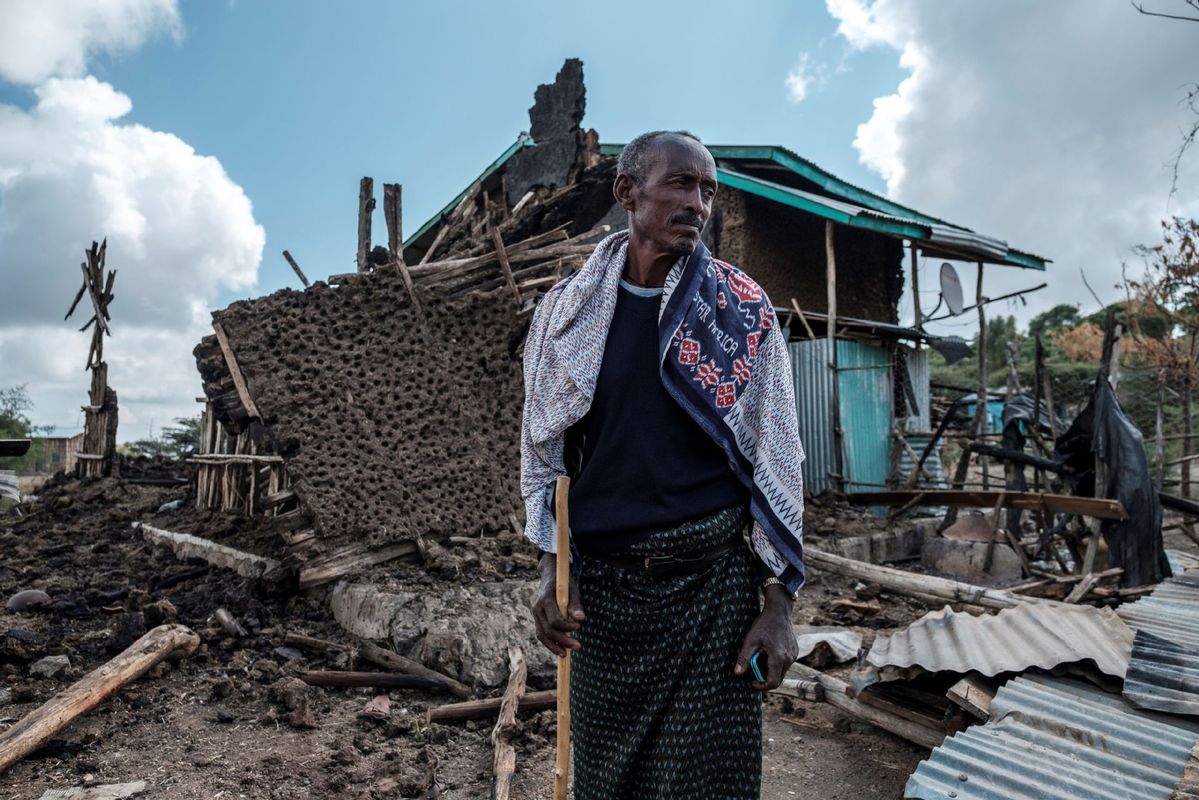Conflicts in Ethiopia, Niger frustrate coronavirus fight, humanitarian aid
Time of issue:
2021-01-06
Author:
Origin:

A man stands in front of his destroyed house in the village of Bisober in Ethiopia's Tigray region, on Dec 9, 2020. [Photo/Agencies]
The ongoing conflicts in Niger and Ethiopia's Tigray region continue to frustrate humanitarian aid access and efforts to curb spread of novel coronavirus even as the continent struggles with the fight against the second wave of the virus.
So far, coronavirus has infected 125,622 in Ethiopia and killed 1,948, while in Niger, the virus has infected 3,465 and killed 110.
According to the United Nations, conflicts in the two countries have forced hundreds to flee their homes, and the insecurity is frustrating efforts by humanitarian organizations to help displaced people.
The United Nations Office for the Coordination of Humanitarian Affairs said on Monday that so far more than 222,000 people have been internally displaced due to the recent conflict in Tigray region, in addition to 100,000 people displaced prior to the conflict.
While humanitarian access into some areas of Tigray has slightly improved recently, the UN agency said it remains critically challenged by insecurity and bureaucratic constraints throughout the region.
Its initial assessment findings indicate a dire humanitarian situation throughout the region, with poor access to services and limited livelihoods, as well as urgent needs for shelter, food, non-food items, water, and sanitation and hygiene, as well as health and protection services.
Additionally, health facilities in major cities are partially working with limited to no stock of supplies and an absence of health workers, while facilities outside major cities are not operational.
Despite the challenges, the UN continues to engage with the government of Ethiopia and all relevant interlocutors for the safe passage of humanitarian personnel and supplies to all parts of Tigray region.
In Niger, the UN Office for the Coordination of Humanitarian Affairs said an estimated 1,000 people have been displaced due to attacks on Tchamo Bangou and Zaroumadareye villages.
Additionally, people fearing further attacks are fleeing areas around the two villages.
The attacks on the two villages were made on Jan 2 by armed groups who killed at least 100 people and injured 25 others.
According to the United Nations High Commissioner for Refugees, those who have been displaced are trying to reach Ouallam, a town about 90 kilometers north of Niamey in southwestern Niger, with most making the journey on foot.
The UN agency said while with partners it's already providing humanitarian assistance to refugees, internally displaced people and the vulnerable among their hosts, the coronavirus pandemic is complicating the humanitarian response.
"We are preparing to assist the people with essential care, shelter, and protection, but also psychological support to help them overcome the horror they have experienced," Alessandra Morelli, the Niger representative of the UN High Commissioner for Refugees, said in a statement on Monday.
The UN is calling on armed groups in Niger to comply with international humanitarian law and immediately stop all attacks against civilians and civilian infrastructure, and ensure adequate conditions for the humanitarian response operations.
Niger's Tillaberi and Tahoua regions, located near Liptako-Gourma, which borders Burkina Faso and Mali, currently host 60,000 Malian refugees and nearly 4,000 who fled Burkina Faso. It also hosts 138,229 internally displaced Nigerians, a number that increased by 77 per cent in 2020.
Niger, Burkina Faso, and Mali in the Sahel are at the epicenter of one of the world's fastest-growing displacement and protection crises. The region is already hosting 851,000 refugees and nearly 2 million displaced inside their own country.
By Edith Mutethya in Nairobi, Kenya | chinadaily.com.cn | Updated: 2021-01-05 17:36


